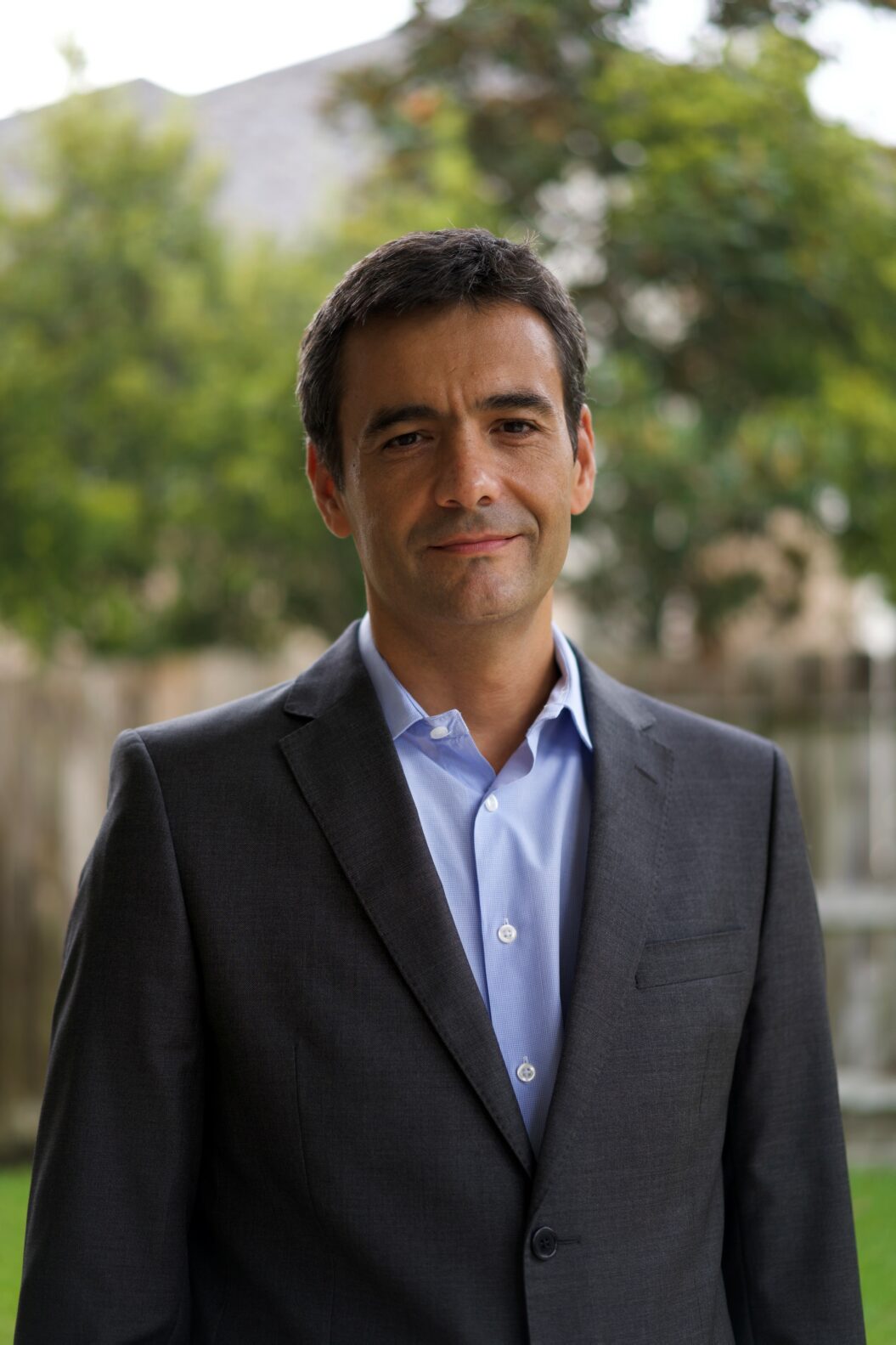Portuguese people who are making a name for themselves abroad are helping to find out where business opportunities are and what kind of companies and activities the country can attract. An initiative that brings together Negócios and the Portuguese Diaspora Council.
1- What led you to leave Portugal?
In January 2005, a coincidence meant that my wife and I were at the airport on the same day, leaving Portugal, expatriated by our companies to Germany and France respectively. The reason for the move was a common family project: to explore the world and boost our careers. After a year, we managed to reunite in Paris, and since then we’ve always travelled together. So far, we’ve travelled to six countries besides Portugal: France, Poland, Brazil, the USA, Singapore and now China.
2- What advantages or disadvantages did being Portuguese bring you?
I believe that, above all, we have significant advantages, since Portugal is known for its openness to other cultures and its historical connection with various countries around the world. Furthermore, in a current context full of challenges in relations between major economic powers, Portugal is recognised as a bridge between nations. Although this is a relatively recent phenomenon, multinationals are already noticing that Portuguese talent stands out for its adaptability and willingness to travel and work in multicultural environments. The ‘Portugal Brand’ related to human talent is becoming increasingly consolidated. It’s worth emphasising that our curiosity about other cultures, often associated with an inferiority complex – as if everything abroad is better – actually turns out to be an advantage. This curiosity makes us more receptive to new experiences, something that is evidenced by the remarkable ability of our Portuguese communities to integrate into the countries in which they find themselves.
3- What obstacles did you have to overcome and how did you do it?
The obstacles we face are mainly related to the experience of living outside Portugal and the need to maintain connections with family and friends. This requires considerable effort, such as celebrating birthdays on video calls and planning holidays with detailed diaries to maximise time with as many people as possible in a short space of time. In addition, we deal with the challenge of understanding the cultures of the places where we live and adapting to them. This process of adaptation makes us grow as individuals and is, as mentioned earlier, one of the main reasons why we chose this lifestyle more than 20 years ago.
4- What do you admire most about the country you’re in?
My experience in China is still recent, as I arrived just over a year ago, but I’ve already realised the dynamics of business and the way things happen here – the famous ‘China Speed’! Here, we spend more time discussing how to accomplish tasks than questioning why they aren’t feasible. A phrase that struck me deeply was: ‘In China, nothing is easy, but everything is possible’. An example of this dynamic is the rapid industrialisation that the country has experienced over the last 30 years, taking it to leading positions in various industries, such as steel and chemicals, as well as providing impressive economic growth. In 1980, China accounted for around 2 per cent of the world’s economic output; today, that figure is around 30 per cent. We are currently witnessing a new acceleration in more innovative sectors, such as the semiconductor industry, renewable energies and electric vehicles. In addition, the digitalisation of the economy is on the rise. Today, for example, we do practically everything by mobile phone, and around half the cars on the road in Shanghai are electric. Those who haven’t visited China in the last ten years will hardly recognise the country!
5- What do you admire most about the company or organisation you work for?
When I joined Air Liquide in 1999, what attracted me most was the opportunity to learn in an initial role with a technical focus in the area I studied (Chemical Engineering), with the possibility of later developing my career in the business area that had always interested me. In addition, the chance to get to know new countries and cultures was a big attraction. The fact that I had examples of Portuguese people in the same company who had successfully followed this path before me was also motivating. Today, more than 25 years later, and after having lived in 7 countries, I can say that it was an excellent choice! Air Liquide is present in more than 60 countries and has been established in China for more than 30 years. The company’s growth in that country is truly remarkable. Today, we have operations in more than 40 cities, around 150 production centres and more than 5,000 employees – all in just over three decades! Being part of this history and contributing to the growth of the company and its employees is extremely motivating!
6- What recommendations would you give to Portugal and its entrepreneurs and managers?
There’s a lot of talk these days about how to attract new generations to settle in Portugal. Although I recognise that, in a globalised market, the movement of people is natural, I believe that we can implement initiatives to make careers in Portugal more attractive. I would highlight two approaches to this issue: firstly, the management model in Portuguese companies can still evolve significantly to adopt career development methodologies based on meritocracy. The absence of this practice continues to be a factor that leads many young people to seek opportunities in other countries. Secondly, Portugal is a country that is receptive to new cultures, has an above-average level of English and a quality higher education system, although not yet widely recognised internationally. A specific action to increase this recognition could involve attracting descendants of the diaspora. A concrete step would be to create an office to support access to higher education for students living outside the country, providing administrative assistance such as curriculum equivalence and other processes. Although my children have not yet reached this stage, I have heard several stories from members of the diaspora who have faced difficulties and a lack of support in this process. I believe that this initiative could attract many young Portuguese born abroad to study in Portugal, strengthening their connection with the country. This, in turn, would reinforce ‘Brand Portugal’ in terms of talent, which would benefit the country’s development. A notable example of attention to the quality of education and meritocracy that I have encountered throughout my career is Singapore, which in recent decades has achieved extraordinary development, even with limited resources.
7- In which sectors of the country where you live could Portuguese companies find clients?
China has a vast market and immense potential. I believe that the beverage, food and tourism sectors are the most obvious, those in which Portuguese companies can present their proposals and which, in some cases, are already actively present in the market. This summer, I had the opportunity to talk to several friends who had travelled to Portugal from Shanghai. They were fascinated by our gastronomy and the hospitality of the Portuguese people. It’s clear that recognition of our country and our culture is growing, as it has in other destinations. In addition, China is developing rapidly in sectors related to the Energy Transition, such as renewable energies and electric vehicles. This presents a significant opportunity for Portuguese companies that identify these segments as target markets.
8- In which sectors in Portugal might companies from the country where you live want to invest?
I believe that Portugal, with an energy matrix that values renewable energies and a promising market for technologies such as electric vehicles and hydrogen produced by electrolysis, is well positioned. China leads in these areas, and although the Portuguese market is not one of the largest in Europe, it can be seen as a gateway to the continent. Currently, Chinese companies are in a phase of internationalisation and expansion, focusing primarily on the so-called ‘Global South’, but also towards Europe, where they need to attract talent and establish international cooperation. I see this as an excellent opportunity to promote the talent of ‘Brand Portugal’ and for companies that have a solid understanding of the African and South American markets.
9- What is the competitive advantage of the country you live in that could be replicated in Portugal?
I believe that the competitive advantage that has impressed me the most is the ability to carry out infrastructure projects with unrivalled competitiveness and speed. This agility makes it possible to realise various other developments. One notable example is the massive investment in renewable energies, which allows companies like Air Liquide to significantly reduce their emissions. In addition, when addressing the issue of meritocracy, I was positively surprised by the preparedness and professionalism of local governments in China, which demonstrate a deep understanding of companies and their needs. I believe that continuing, and even accelerating, the process of reducing bureaucracy and simplifying administrative procedures will be extremely beneficial for Portugal, increasing its ability to attract investment.
10- Are you thinking of returning to Portugal? Why do you think so?
We are considering the possibility of returning, just like any emigrant, although we don’t know if this will happen during our working lives. However, in the near future, we would like our children to maintain a connection with Portugal. In this sense, pursuing higher education in Portugal is a viable option and, who knows, it could become another reason for us to return in the future!







